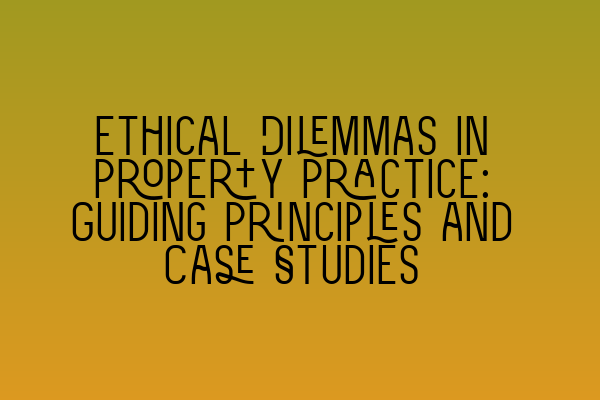Ethical Dilemmas in Property Practice: Guiding Principles and Case Studies
Welcome to the SQE Property Law & Land Law blog! In this post, we will explore the ethical dilemmas that arise in property practice and discuss the guiding principles that can help solicitors navigate these challenging situations. Through real case studies, we will shed light on the complexities of property law and emphasize the importance of acting ethically in this field.
The Importance of Ethics in Property Practice
Property law is a cornerstone of our legal system, governing the rights and responsibilities associated with land and real estate. As property solicitors, it is our duty to uphold the highest ethical standards to ensure fairness, equity, and justice for all parties involved.
While property practice often presents unique challenges, ethical considerations should guide our decision-making process. These considerations include:
- Conflicts of interest
- Client confidentiality
- Disclosure of material facts
- Professional competence
- Fair and honest dealings
By adhering to these guiding principles, we not only protect our clients’ interests but also maintain the integrity of the legal profession.
Case Study: Conflict of Interest
Let’s consider a case study involving a property solicitor who represents both the buyer and seller in a residential transaction. While it may be tempting to accept dual representation for financial gain, this practice raises significant ethical concerns.
Conflicts of interest can arise when the interests of clients directly clash. In this scenario, the solicitor must carefully evaluate whether they can provide unbiased advice and ensure fair treatment for both parties. It is crucial to obtain informed consent from both clients, clearly explaining the potential risks and limitations involved.
While dual representation is not inherently unethical, solicitors must exercise caution to avoid compromising their duty of loyalty and undivided commitment to their clients.
Case Study: Client Confidentiality
Client confidentiality is a fundamental principle of the legal profession, protecting the trust and privacy of individuals seeking legal advice. In property practice, solicitors often acquire sensitive information about their clients and their legal matters.
Consider a scenario where a property solicitor becomes aware of illegal alterations made to a property being sold. The solicitor may be torn between their duty to disclose this information to potential buyers and their duty to maintain client confidentiality.
In this case, the solicitor must carefully analyze the legal and ethical implications. While client confidentiality is important, it is equally essential to prevent harm to third parties and uphold the integrity of the property market. The solicitor should seek professional guidance and consider the potential legal repercussions before making an informed decision.
Case Study: Disclosure of Material Facts
An ethical duty exists for solicitors to disclose material facts to their clients. Material facts refer to information that could significantly impact the value or desirability of a property. Failure to disclose such facts can lead to serious legal consequences and harm the reputation of the solicitor.
For instance, suppose a property solicitor is aware of environmental contamination on a property being sold but fails to disclose it to the buyer. This omission can result in substantial financial losses and potential health risks for the buyer.
By prioritizing transparency and providing accurate information, solicitors can not only fulfill their ethical obligations but also develop trust and credibility with their clients.
Case Study: Professional Competence
Professional competence is a vital aspect of property practice ethics. Solicitors must possess the necessary knowledge, skills, and experience to competently handle property-related matters. Failing to meet the required standards of competence can jeopardize the clients’ interests and the reputation of the legal profession.
Consider a situation where a property solicitor lacks expertise in leasehold matters but still takes on a leasehold transaction. In this case, the solicitor must identify their limitations and either acquire the necessary knowledge or refer the client to a specialist solicitor who can provide the required expertise.
Recognizing professional limitations, seeking appropriate support, and maintaining continuous professional development are crucial for ethical property practice.
Case Study: Fair and Honest Dealings
Honesty and fairness are at the core of ethical property practice. Solicitors must ensure that all transactions are conducted with integrity and that they provide accurate and unbiased advice to their clients.
In a hypothetical case where a property developer attempts to withhold information about a structural defect from potential buyers, the solicitor must intervene. By advocating for transparency and honesty, solicitors can protect their clients from financial harm and maintain the reputation of the property industry.
Conclusion
Ethical dilemmas are an inherent part of property practice, and solicitors must handle them with the utmost professionalism and integrity. By adhering to guiding principles such as conflicts of interest, client confidentiality, disclosure of material facts, professional competence, and fair and honest dealings, solicitors can navigate these dilemmas and provide excellent service to their clients.
At SQE Property Law & Land Law, we emphasize the importance of ethics in property practice. Our team of solicitors is dedicated to upholding the highest ethical standards while offering expert legal advice and representation.
For more resources related to the SQE exams and preparation, be sure to check out our SQE 1 Practice Exam Questions and SQE 1 Practice Mocks FLK1 FLK2. We also provide comprehensive SQE 2 Preparation Courses and SQE 1 Preparation Courses to help you succeed in your legal career. Stay updated with the latest SRA SQE Exam Dates for smooth planning and preparation.
